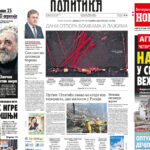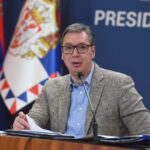- Kosovo joining Council of Europe
On March 27, the Committee on Political Affairs and Democracy of the Parliamentary Assembly of the Council of Europe endorsed the positive conclusion by the rapporteur on Kosovo, Dora Bakoyannis (Greece), who recommended that Kosovo’s accession to the Council of Europe be approved.
In April, the PACE will vote on the issue at its session. After a positive vote, the conclusion shall be sent to the Committee of Ministers, which is to vote on Kosovo’s membership at the next ministerial meeting to be held in May.
Thirty-one members of the political committee voted for Kosovo’s accession to the Council of Europe, four voted against, and one – Greece – abstained.
Two representatives from Serbia, one from Bosnia and Herzegovina, and one of Montenegro stood against the move.
Despite the fact that Montenegro recognized Kosovo, the head of the Montenegrin delegation to the Parliamentary Assembly of the Council of Europe (PACE), Maja Vukicevic (a member of the pro-Serbian Democratic People’s Party), voted against Kosovo’s accession to the CoE. Instead, the Montenegrin Minister of European Affairs, Maida Horcevic, while on a visit to Pristina, said Montenegro would support Kosovo’s accession to the CoE when the Committee of Ministers of the Council of Europe will be voting on the decision.
Serbia’s reaction to the possible admission of Kosovo to the Council of Europe will be powerful and responsible, Serbian President Aleksandar Vučić warned, noting that he does not yet intend to say exactly how Belgrade will respond. Previously, the Serbian leadership did not rule out Serbia’s withdrawal from the Council of Europe should Kosovo join.
Among other complications for Serbia will be the expected worsening of relations with Greece due to the position of the Greek rapporteur regarding Kosovo’s membership in the CoE.
There is another threat facing Montenegro – diametrically opposed positions on Kosovo within the ruling coalition could lead to internal political disputes and a government crisis.
- Difficult days await Serbia
The President of Serbia, Aleksandar Vučić, warned that Serbia and the Republika Srpska are facing “difficult days”, first posting the warning on social media and then speaking out in public.
In his address on the evening of March 29, he said the first challenge is Kosovo’s admission to the Council of Europe, the second is the potential adoption at the UN General Assembly in April of a resolution recognizing the mass killing of Bosniaks in Srebrenica in 1995 as genocide.
Although the UNGA resolution will not be binding, Vučić does not rule out that after the events in Srebrenica are recognized as genocide, Republika Srpska’s very right to exist will be challenged as an entity formed as a consequence of genocide. Also, in his opinion, “based on a single non-binding verdict, Republika Srpska will also be required to pay war reparations.”
There are currently no documentary confirmations of such plans, which does not prevent Serbian politicians and Russian media from making alarmist statements about the future implications of the UNGA resolution for Serbia, Republika Srpska, and Serbs in general.
- Republika Srpska issues ultimatum over changes to election law
The High Representative of the international community in Bosnia and Herzegovina, Christian Schmidt, put forward technical amendments to the Law on Elections. The changes relate to the introduction of scanners and CCTV cameras at polling stations, while the Central Election Commission of Bosnia and Herzegovina has been given the authority to appoint the heads of election commissions.
The amendments also provide for a ban on running for office for those who have been convicted of war crimes.
***
In response, the People’s Assembly of Republika Srpska adopted a Resolution requesting within seven days to revoke all decisions of the High Representative of the International Community, Christian Schmidt, whom the document labeled as “falsely representing himself as a High Representative.”
If this fails to be done, the People’s Assembly of the Republika Srpska requests that the Parliament of Bosnia and Herzegovina convene for a session as soon as possible to declare all the decisions made by Christian Schmidt null and void and to prohibit the BiH authorities from implementing them. In addition, the NSRS demands that at the same session, the BiH Parliamentary Assembly pass the Law on Elections in Bosnia and Herzegovina.
If the Resolution of the RS People’s Assembly is not implemented, the Republika Srpska will withdraw from all BiH-level agreements (including on the army and taxation), and the RS People’s Assembly will adopt its own law on the elections in Republika Srpska.
The decision of the RS People’s Assembly was, in fact, yet another step by the RS authorities toward secession from Bosnia and Herzegovina, indicating the ongoing escalation.
- Kosovo, Montenegro to develop cross-border cooperation
Kosovo and Montenegro have sealed the Agreement on cross-border cooperation for 2021-2027, signed by Deputy Prime Minister of Kosovo Besnik Bislimi and Minister of European Affairs of Montenegro Maida Horcevic.
The program aims to promote good neighborliness, integration into the EU, as well as social and economic development of cross-border territories.
According to Bislimi, the document allows for receiving support from the European Union for projects in the “cross-border cooperation” category in the amount of EUR 8.4 million.
The signing of the agreement took place almost immediately after the PACE political committee voted on Kosovo’s accession to the Council of Europe. Thus, in addition to serving its direct purpose, the deal intended to neutralize the negative effect of the Montenegrin representative’s vote against Kosovo’s accession to the CoE and prevent deterioration of relations between Pristina and Podgorica.
- In Serbia, fighter jets scramble to intercept an unidentified aircraft
On March 31, at 10:39, “permanently operating forces controlling and protecting the sovereignty of the airspace of the Republic of Serbia detected an unknown flying object over Valjevo at an altitude of 5,500 meters” before a pair of MiG-29 fighter jets took off to intercept the target, Serbia’s Ministry of Defense reported. Soon the target disappeared from radars. “After surveying the area, a pair of fighter jets on duty were ordered to return to the base, and the rest of the forces continued regular monitoring and surveillance of the airspace,” the Ministry of Defense explained.
The following day, Serbian President Aleksandar Vučić, during a visit to the military airfield in Batajnica, announced that the unidentified flying object turned out to be a spy balloon that shortly left the airpspace after collecting data.
In his opinion, the Serbian military reacted adequately but the next time an unknown flying object is spotted, it has to be downed to determine whom it belongs to, said Vučić.
The events revolving around the balloon over Valjevo demonstrate an important component of the current domestic policy pursued by President Vučić, who tries to keep the public “mobilized”. To this end, he keeps telling citizens about the existing threats, assuring them of Serbia’s ability to counter them.
- North Macedonia’s president warns of strengthened Russian influence over European integration slowdown
Support for EU accession among ethnic Macedonians is plummeting due to Bulgaria’s stance, which effectively blocked the neighboring country’s advancement to the European Union. At the same time, due to slowdown in European integration, Russian influence is increasing in the region where ideas of cooperation with BRICS are being voiced.
This was stated by the President of North Macedonia, Stevo Pendarovski, who spoke in an exclusive interview with Croatia’s television.
Answering the question of whether support for joining the EU among ethnic Macedonians is falling after 20 years of remaining “in the waiting room”, Pendarovski emphasized: “It is falling sharply, and here are the data: in the past two years, this support has halved.” In his opinion, this is due to the position of Bulgaria, which came forward “with a non-European, anti-European policy” and demanded that “their historical narrative be fully accepted by Macedonia and the Macedonian people.”
The president of North Macedonia emphasized that the Macedonians never received the support for their accession to the European Union they had counted from the EU’s leading powers.
He also emphasized that the lack of attention in Brussels to the Western Balkans “opened the door wide for Russian influence in the region.” According to him, due to Russia’s war in Ukraine, “so-called regional proxies” are currently operating more actively. “There are entire structures in the region that cannot wait for the so-called ‘European story’ to be backshelved and for some supposedly Russian alternative to come. And not only Russian, maybe Chinese, or else,” the president of North Macedonia noted, adding that recently these structures have been talking a lot about BRICS.
Stevo Pendarovski’s statement is related to the parliamentary and presidential election campaign in North Macedonia. According to forecasts, the opposition, which has always stood against compromises related to the identity of Macedonians for the sake of European integration, has a chance to come to power amid the blocking of North Macedonia’s accession to the EU over Bulgaria’s position.



